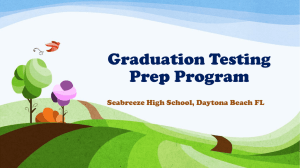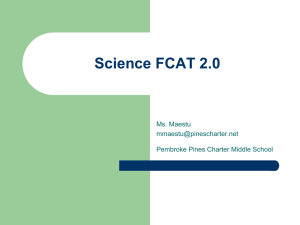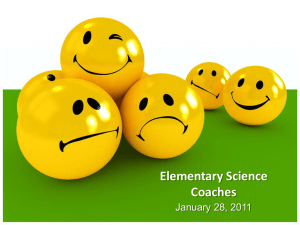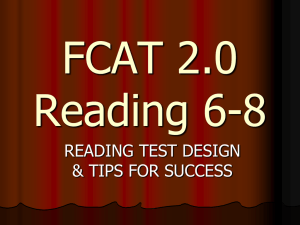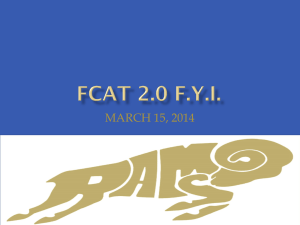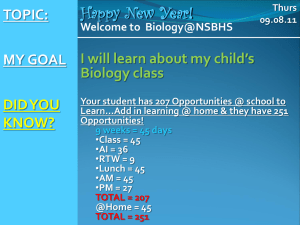FCAT 2.0 - Thomas Jefferson High School
advertisement
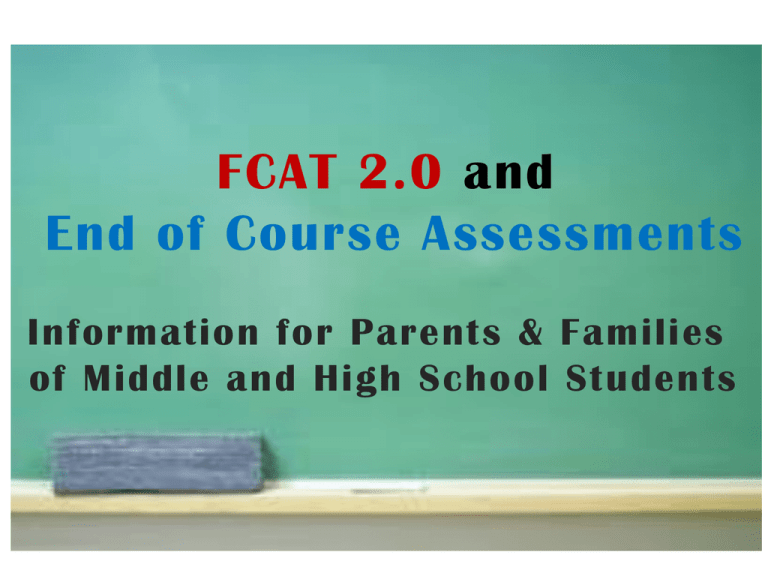
FCAT 2.0 and End of Course Assessments Information for Parents & Families of Middle and High School Students What is the FCAT 2.0? • Test given in grades 3 -10 • Based on Next Generation Sunshine State Standards (NGSSS) in reading, math, science, and writing • School-wide FCAT results are used to determine a school’s annual grade Which FCAT 2.0 tests will my child take in Spring 2012? 6th Math Reading Science Writing 7th 8th 9th 10th How many questions are on each FCAT 2.0 Test? 6th 7th 8th Math 50-55 50-55 60-65 Reading 50-55 50-55 50-55 9th 10th 50-55 50-55 Science 60-66 Writing 1 1 prompt prompt How much time is given for each FCAT 2.0 test? 6th Reading Math 140 minutes 140 minutes *Computer Based 140 minutes 7th *Computer Based 8th 140 minutes 9th 140 minutes 10th *Computer Based 140 minutes *Computer Based Science 140 minutes 140 minutes 160 minutes What topics are tested on the Mathematics FCAT 2.0? Grade Topics • Fractions, Ratios, Proportional Relationships, and Statistics 6th • Expressions and Equations • Geometry and Measurement • Number: Base 10 7th • Ratios and Proportional Measurement • Geometry and Measurement • Statistics and Probability • Number: Operations, Problems, and Statistics 8th • Expressions, Equations, and Functions • Geometry and Measurement What topics are tested on the Reading FCAT 2.0? Students in grades 6 - 10 will be tested on: Vocabulary Reading Application Literary Analysis: Fiction and Non-Fiction Informational Text and Research Process How long are the passages on the Reading FCAT 2.0? Grade Number of words per passage Range Average 6th 200 - 1100 700 7th 300 - 1100 700 8th 300 - 1200 700 9th 300 - 1400 900 10th 300 - 1500 1000 What topics are tested on the Science FCAT 2.0? Eighth graders will be tested on: Physical and Chemical Science Earth and Space Science Life and Environmental Science Scientific Thinking What types of prompts are given on the Writing FCAT 2.0? Grade 8th 10th Narrative (tell a story) Expository Persuasive (explain) (convince) What are some examples of writing prompts my 8th or 10th grader may be given? Example of an expository prompt: Most people enjoy doing some activity. Think about an activity you enjoy. Now explain what you enjoy about this activity. Example of a persuasive prompt: A class plans to eat at a special place for a class celebration. Think about where the class should eat for the celebration. Now write to convince the class why the celebration should be held at the place you think is best. What format are the questions given in on the FCAT 2.0? Subject Multiple Choice Gridded Response Written Response Math 6, 7, 8 Reading 6, 7, 8, 9, 10 Science 8 Writing 6, 7, 8 8 and 10 What does the student report look like? What does the student report look like (cont.)? How do I understand my child’s FCAT 2.0 results? Reading Scale Score Math Scale Score Achievement Level 6th 167 - 283 170 - 284 1-5 7th 171 - 289 179 - 292 1-5 8th 175 - 296 187 - 298 1-5 9th 178 – 302 n/a 1-5 10th 188 - 302 n/a 1-5 What does the FCAT 2.0 Achievement Level mean? Success with Challenging Content of Level Proficient? NGSSS 1 Inadequate Level of Success NO 2 Below Satisfactory Level of Success NO 3 Satisfactory Level of Success YES 4 Above Satisfactory Level of Success YES 5 Mastery (including the most challenging questions) YES FCAT 2.0 Math Scale Scores by Achievement Level by Grade Level Grade Level 1 Level 2 Level 3 Level 4 Level 5 6th 170 - 212 213 – 226 227 - 239 240 - 252 253 - 284 7th 179 - 219 220 – 233 234 - 247 248 - 260 261 - 292 8th 187 - 228 229 - 240 241 - 255 256 - 267 268 - 298 FCAT 2.0 Reading Scale Scores by Achievement Level by Grade Level Grade Level 1 Level 2 Level 3 Level 4 Level 5 6th 167 - 206 207 - 221 223 - 236 237 - 251 252 - 283 7th 171 - 212 213 - 227 228 - 242 243 - 257 258 - 289 8th 175 - 217 218 - 234 235 - 248 249 - 263 264 - 296 9th 178 - 221 222 - 239 240 - 252 253 - 267 268 - 302 10th 188 - 227 228 - 244 245 - 255 256 - 270 271 - 302 What are the End of Course (EOC) Assessments? • Tests that measure student achievement of the Next Generation Sunshine State Standards (NGSSS) for specific courses • Created to increase student achievement and improve college and career readiness • Given to students taking Algebra, Geometry, Biology and/or US History Which End of Course (EOC) assessments will my child take in Spring 2013? Students enrolled in the following courses will take the specified EOC exam: EOC exam Algebra 1, Algebra 1 Honors, Algebra 1B, and Pre-AICE Mathematics 1 Algebra Geometry , Geometry Honors, and Pre-AICE Mathematics 2 Geometry Biology, Biology 1 Honors, Pre-AICE Biology, Biology Technology, Biology 1 Pre-IB, Integrated Science 3, and Integrated Science 3 Honors Biology United States History, United States History Honors US History How many questions are on each EOC Assessment? Assessment Number of Questions Algebra 55 - 65 Geometry 55 - 65 Biology 60 - 66 US History TBD Fall 2012 How much time is given for each EOC assessment? Assessment Length of Time Given Algebra 160 minutes Geometry 160 minutes Biology 160 minutes US History TBD Fall 2012 What topics are tested on the Algebra and Geometry EOC Assessments? EOC Assessment Topics • Functions, Linear Equations, and Inequalities Algebra • Polynomials • Rationals, Quadratics, and Discrete Mathematics • Two-Dimensional Geometry Geometry • Three-Dimensional Geometry • Trigonometry and Discrete Mathematics What topics are tested on the Biology and US History EOC Assessments? EOC Assessment Topics • Molecular and Cellular Biology Biology • Classification, Heredity, and Evolution • Organisms, Populations, and Ecosystems US History TBD Fall 2012 What format are the questions given in on the EOC assessments? Subject Multiple Choice Fill-in Response Algebra Geometry Biology US History Note: The EOC assessments are computer-based tests. How do I understand my child’s Algebra EOC results? Algebra EOC Achievement Level Algebra EOC Scale Score 1 2 3 4 325 - 374 5 437 - 475 375 - 398 399 - 424 425 - 436 How do I understand my child’s Geometry EOC results? Geometry Achievement Level Geometry Scale Score 1 2 3 4 TBD Fall 2012 5 TBD Fall 2012 TBD Fall 2012 TBD Fall 2012 TBD Fall 2012 How do I understand my child’s Biology EOC results? Biology Achievement Level Biology Scale Score 1 2 3 4 TBD Fall 2012 5 TBD Fall 2012 TBD Fall 2012 TBD Fall 2012 TBD Fall 2012 How do I understand my child’s US History EOC results? • Scores will use a special scale known as a T- Scale that ranges from 20 - 80 • The score of 50 will be set at the state-wide average • Individual score reports will indicate whether the students’ scores falls within the highest third, middle third, or bottom third levels How will teachers use the FCAT 2.0 and EOC scores to help my child? Together with other data, teachers use the information to: • Make instructional decisions •Plan individualized lessons •Group students according to strengths/needs How can I help my child? • Communicate with your child’s teacher; discuss strategies to use at home; work together as a team • Encourage your child to read; read with your child • Take your child to the library regularly • Ask your child to retell stories he or she has read • Ask your child “why” questions about what he or she has read • Ask your child to compare and contrast stories and characters • Provide a quiet environment for your child to study and do homework How can I help my child (cont.)? • Find ways for your child to practice writing at home, such as by writing notes to family members. • Provide regular encouragement to your child, especially when he or she has done well. • Study math facts with your child • Encourage your child to think and explain • www.fcatexplorer.com (password required) • www.myon.com (password required • www.FLAssessments.com/ePAT How can I help my child right before the test? Keep a positive attitude toward the test. Help your child relax. Keep a normal routine at home. Make sure that your child has a good night’s sleep. Give your child a good breakfast. Where can I get additional information? •Hillsborough County Public Schools: http://www.sdhc.k12.fl.us/ •HCPS Assessment & Accountability: http://aaaweb.mysdhc.org/assessment1 •FCAT Information from FLDOE: http://fcat.fldoe.org/fcat2/ •HCPS Parent/Family Resource Handbook: http://www.sdhc.k12.fl.us/involvement/Documents/Resource_Gui de/index.asp A child's ideas about education and its significance begin with the parent.


